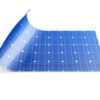
Lightweight, bendy, cheaper – the promise of organic solar panels
Today’s silicon solar panels are an industry standard, but these rigid, heavy blocks may be shunted aside by plastic rivals – lightweight, flexible solar panels that could be printed and stuck onto buildings or placed in windows or cars, turning light into electricity in locations inaccessible to their heavier cousins.
Researchers are exploring the potential of lightweight, flexible plastic solar panels that could revolutionize the solar industry. These panels, based on organic photovoltaic (OPV) technology, offer a flexible and cost-effective alternative to traditional silicon solar panels. Unlike rigid silicon panels, these plastic counterparts can be printed and easily attached to various surfaces like buildings, windows, and vehicles, making them accessible in previously untapped locations.
A project consortium consisting of companies and academic partners is developing two demonstration products. The first is a stick-on solar panel that can be attached to diverse surfaces, such as doors, floors, cars, or roofs. This innovative light-harvesting material will adorn the headquarters of the energy company ENI in Rome, Italy, showcasing the viability of this approach. The second demonstration involves integrating plastic solar panels with textiles, commonly used to cover buildings during renovation, and will be installed on a university building in Nuremberg, Germany.
In parallel, theoretical physicist Dr. Fassioli is pioneering research to enhance the power conversion efficiency of organic solar cells. Her work explores the interaction between organic molecules and light, particularly within optical cavities that trap light particles, known as photons. This interaction gives rise to hybrid states called polaritons, where light and matter merge in a quantum physics phenomenon. These synchronized collective behaviors of excited molecules have the potential to significantly improve the efficiency of photovoltaics.
Dr. Fassioli's research represents a fundamental exploration of the interplay between matter and light, with the aim of modifying the properties of organic solar cells for greater energy conversion. While her work is not geared toward immediate commercial applications, it lays the groundwork for future advancements that could harness more of the sun's energy and further the development of organic solar cells.
Read the full magazine article here.






Lightweight, bendy, cheaper – the promise of organic solar panels 0 reviews
Login to Write Your ReviewThere are no reviews yet.